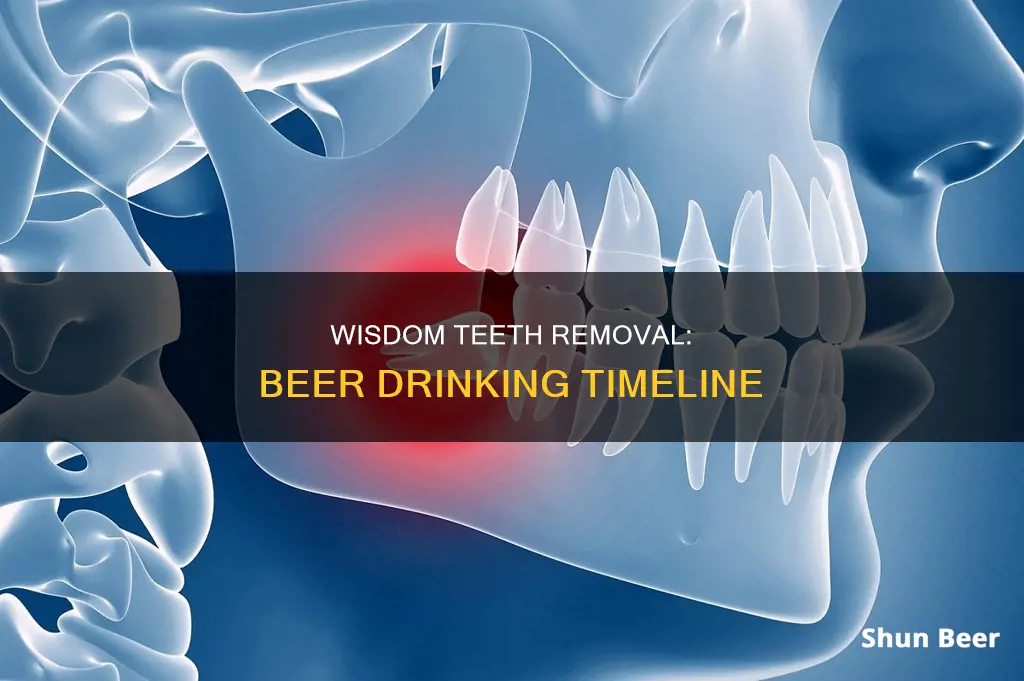
It's important to know how long to wait before drinking alcohol after a wisdom tooth extraction. Drinking alcohol after a tooth extraction can lead to unnecessary complications that may prolong your recovery. After a tooth extraction, a blood clot must form in the extraction area until granulation tissue forms, which can take about a week or more. If the blood doesn't clot, you could get a dry socket, a painful condition that slows down the recovery process. It is recommended to wait at least 48 hours before resuming alcohol consumption, and to wait until you no longer need pain medication, as mixing pain medication and alcohol can be dangerous.
| Characteristics | Values |
|---|---|
| Time to wait before drinking beer | At least 48 hours |
| Time to wait before drinking beer if taking painkillers | Until you finish your course of painkillers |
| Time to wait before drinking hot coffee | 48 hours |
| Time blood clots take to form | 24 hours |
What You'll Learn
- Drinking beer after wisdom teeth removal can cause post-operative bleeding
- It is recommended to wait at least 48 hours before drinking beer
- Drinking beer while on pain medication is dangerous
- Drinking beer can hinder the body's natural healing process
- It is best to drink water instead of beer to stay hydrated and promote healing

Drinking beer after wisdom teeth removal can cause post-operative bleeding
Drinking beer after wisdom tooth removal can cause post-operative bleeding. It is strongly recommended that you refrain from drinking beer or any other alcoholic beverage for at least 48 hours after the procedure. During the first 24 hours, in particular, it is crucial to allow your mouth to rest and heal. This includes letting blood clots develop and ensuring that the bleeding stops. Drinking alcohol too soon can disrupt this process and lead to excessive bleeding.
Wisdom tooth removal is a common dental procedure, often performed due to crowding in the mouth or impacted teeth. Following the surgery, it is essential to follow the post-operative instructions provided by your dentist or oral surgeon. In addition to avoiding alcohol, you should also refrain from using a straw and take any prescribed medications as directed. These measures will help to ensure that you heal efficiently and reduce the risk of complications.
One of the most common complications of wisdom tooth removal is dry socket, which can occur if a blood clot does not form properly or becomes dislodged from the surgery site. Drinking alcohol within the first 48 hours after the procedure can increase the chances of developing dry socket. Dry socket typically causes an intense throbbing pain in the gums or jaw, similar to a toothache, and may also result in a foul-smelling odour and exposed bone in the empty socket.
In addition to the risk of dry socket, consuming alcohol after wisdom tooth removal can also interfere with the healing process and increase the risk of infection. Alcohol can hinder your body's natural ability to heal, prolonging your recovery time. It is advisable to wait at least 7 to 10 days after the procedure before considering drinking alcohol. During this time, it is important to prioritise hydration by drinking plenty of water.
Furthermore, if you have been prescribed painkillers following your wisdom tooth removal, it is crucial to avoid consuming alcohol while taking these medications. Mixing alcohol with certain painkillers can have serious side effects, including liver damage, impaired motor function, dizziness, and overdose. It is essential to follow the instructions provided by your dentist or oral surgeon regarding the use of pain medications and abstaining from alcohol to ensure a safe and smooth recovery.
Understanding Beer Pumps: The Inner Workings Explained
You may want to see also

It is recommended to wait at least 48 hours before drinking beer
It is highly recommended to wait at least 48 hours before drinking beer after wisdom teeth removal. This is because the first 24 hours post-surgery are critical for resting and healing. During this time, your mouth needs to develop blood clots to stop the bleeding. Drinking beer or any other alcoholic beverage can disrupt this process and lead to excessive bleeding.
Additionally, consuming alcohol while taking prescribed painkillers can have serious side effects and adverse reactions. Mixing alcohol with pain medication can increase your risk of falls or injuries, impair your driving ability, and even cause liver damage. Therefore, it is crucial to refrain from drinking beer or any alcoholic beverage until you have completed your course of prescribed painkillers.
To promote a smooth recovery, it is essential to follow your dentist's aftercare instructions. This includes resting for at least 24 hours after the procedure, biting on gauze to aid clotting, and applying a cold compress to reduce swelling, pain, and bruising. It is also recommended to avoid rinsing your mouth vigorously, using a straw, or spitting for at least 24 hours to prevent dislodging the blood clot.
While it may be challenging to abstain from drinking beer or other alcoholic beverages, it is important to prioritise your recovery and well-being. By waiting at least 48 hours and following your dentist's recommendations, you can minimise the risk of complications and ensure a successful and comfortable healing process.
If you have any doubts or concerns, it is always best to consult your dentist or oral surgeon. They can provide personalised advice and guide you through the recovery process to ensure a positive outcome.
Antabuse and Alcohol: Why Drinking Beer is Risky
You may want to see also

Drinking beer while on pain medication is dangerous
After wisdom teeth removal, it is recommended to refrain from drinking alcohol for at least 24 to 48 hours. This is because, during the initial recovery period, your mouth needs to rest and heal, allowing blood clots to develop and bleeding to stop. Drinking alcohol during this critical period can disrupt the formation of blood clots, leading to excessive bleeding and potentially resulting in a condition called dry socket.
However, one of the most important considerations regarding alcohol consumption after wisdom teeth removal is the potential interaction with pain medication. Drinking beer while on pain medication is strongly discouraged due to the serious risks and side effects associated with this combination.
Firstly, both alcohol and pain medication can have a detrimental effect on the liver. Consuming them together can overwhelm the liver, hindering its ability to metabolize both substances effectively. This may lead to a buildup of medication in the bloodstream, increasing the potency of the painkillers and enhancing their side effects. As a result, you may experience adverse effects such as nausea, vomiting, gastrointestinal problems, and even liver damage or failure.
Secondly, the combination of beer and pain medication can impair your motor functions, coordination, and judgment. This impairment can make it more challenging to recognize the symptoms of medication side effects or overdose. Additionally, your alertness and ability to operate vehicles or machinery may be significantly compromised, increasing the risk of accidents and injuries.
Furthermore, mixing beer with certain pain medications can lead to dangerous interactions and unexpected side effects. These can include organ damage, loss of consciousness, seizures, irregular heartbeat, cardiovascular changes, and in severe cases, even death. It is crucial to understand that these risks apply to both prescription and over-the-counter pain medications.
To ensure a safe recovery after wisdom teeth removal, it is advisable to abstain from drinking beer or any alcoholic beverage while taking pain medication. Always follow the instructions provided by your dentist, surgeon, or healthcare provider, and refer to the medication labels for specific warnings and precautions. If you have any doubts or concerns, consult your healthcare provider or pharmacist for personalized advice.
Mixing Beer and Wine: Safe or Not?
You may want to see also

Drinking beer can hinder the body's natural healing process
Drinking beer after a wisdom tooth extraction is not recommended, as alcohol can negatively impact the healing process and lead to complications. It is best to avoid alcoholic beverages for at least 48 hours after the procedure, and ideally, until you have finished your course of prescribed painkillers. This is because alcohol can interfere with the body's natural healing process and cause dry sockets, a common complication wherein a blood clot fails to form or becomes dislodged from the surgery site.
Drinking beer or other alcoholic beverages can hinder the body's natural healing process in several ways. Firstly, alcohol impairs immune function and reduces the body's ability to repair damaged tissues, slowing down the healing of injuries. It can also contribute to excessive inflammation, which hinders healing and increases pain and discomfort. Alcohol consumption can deplete the body of essential vitamins and minerals that are crucial for tissue repair and overall health.
Additionally, alcohol can negatively interact with pain medications, leading to serious side effects such as liver damage, impaired motor function, dizziness, and overdose. It impairs cognitive function and judgment, which are important for making informed decisions about physical activity, medication management, and overall self-care during the recovery process. Alcohol also impairs coordination and balance, increasing the risk of accidents or falls that can lead to re-injury or exacerbation of the existing injury.
Furthermore, alcohol can negatively affect sleep patterns, and quality sleep is essential for tissue repair, hormone regulation, and overall well-being. As a depressant, alcohol can also increase the perception of pain and potentially interact with pain medications, affecting their effectiveness. Mental health can also be impacted, as alcohol consumption can exacerbate feelings of depression or anxiety during a vulnerable time.
In conclusion, it is important to refrain from drinking beer or other alcoholic beverages after wisdom tooth removal to give your body the best chance for a speedy and complication-free recovery.
Beer and Surgery: What's the Safe Timeline?
You may want to see also

It is best to drink water instead of beer to stay hydrated and promote healing
It is recommended that you wait at least 48 hours before consuming beer or any other alcoholic beverage after having your wisdom teeth removed. In the first 24 hours after surgery, it is important to let your mouth rest and heal, allowing blood clots to develop and bleeding to stop. Drinking beer or any other alcoholic beverage during this time can disrupt the healing process and lead to complications such as dry socket.
Instead of reaching for a beer, it is best to drink water to stay hydrated and promote healing. Water is essential for aiding the healing process and keeping your body hydrated. It is also important to remember that alcohol can have adverse effects on your recovery, potentially prolonging the healing time.
In addition to waiting at least 48 hours before consuming alcohol, it is crucial to avoid drinking beer or any other alcoholic beverage while taking pain medications. Mixing alcohol with painkillers can have serious side effects and can be dangerous for your health. It is best to wait until you are finished taking your prescribed painkillers before resuming alcohol consumption.
Furthermore, drinking beer or other acidic drinks can irritate the healing areas of your mouth. It is recommended to avoid acidic drinks for at least one week after surgery. Instead, opt for water or other non-acidic beverages to stay hydrated and support the healing process.
By following the recommendations of dental professionals and choosing water over beer or other alcoholic beverages, you can ensure a smooth and efficient recovery after wisdom teeth removal. Staying hydrated with water will promote healing and help your body recover from the surgery.
Beer and Pregnancy Tests: What You Need to Know
You may want to see also
Frequently asked questions
It is recommended to wait at least 48 hours before drinking beer after wisdom teeth removal. In the first 24 hours, your mouth will need to rest and heal, and drinking alcohol can disrupt this process.
Waiting 48 hours allows blood clots to develop, which helps stop bleeding and prevents dry sockets from occurring. Drinking beer before this time can cause post-operative bleeding and hinder the formation of blood clots.
Drinking beer after wisdom teeth removal can increase the risk of dry socket, a painful condition that slows down the recovery process. It can also impair healing and increase the risk of infection.
No, it is dangerous to consume beer or any other alcoholic beverage while taking pain medication. Mixing pain medication and alcohol can cause serious problems, including liver failure, impaired motor function, and overdose.
It is recommended to drink plenty of water to stay hydrated and aid the healing process. You can also drink milkshakes, apple juice, ginger ale, smoothies, and Gatorade.







